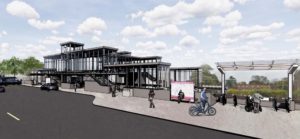
An October 2021 rendering shows the MBTA's proposed design for upgrades to the Auburndale commuter rail station, which include elevators, more platforms and stairs. Image courtesy of the MBTA
Newton city councilors are facing pressure to scale back plans to rezone the community’s 13 commercial nodes for more multifamily development to comply with the state’s MBTA Communities law, but one of the mooted suggestions could come at a cost: plans to revamp its commuter rail stations.
That was the not-too-subtle to letters sent to the council Nov. 14 by Newton’s Democratic Congressman Jake Auchincloss and state Secretary of Housing and Livable Communities Ed Augustus.
The council is set to meet on Wednesday to grapple with the city’s rezoning proposal for the third time this month.
Opponents of the rezoning have criticized city planning staff’s suggestions to modestly upzone more areas than the 8,330 strictly required under the MBTA Communities law, with the area around the city’s Auburndale commuter rail stop emerging as a particular target for criticism. Despite having a train station, due to technicalities with how the regulations implementing the MBTA Communities law, the area isn’t counted as one of the transit stops that the city must allow density near.
The fact that the city’s proposal went above and beyond state requirements in the name of bringing more residents, and thus more foot traffic, to local businesses was also a major talking point for the campaign that successfully forced a number of rezoning supporters off the council in this month’s municipal elections.
But Auburndale Station, like all of Newton’s commuter rail stops, is little more than a decaying asphalt strip wedged between the Massachusetts Turnpike’s eight lanes and the inbound train track, only able to take outbound trains with some complex scheduling that severely limits how many trains can stop there.
The city has been lobbying state and federal officials at the U.S. Department of Transportation and the city’s representatives on Beacon Hill and Capitol Hill for the roughly $170 million needed to turn Newton’s three commuter rail stations into modern ones that can accept the kind of frequent, all-day service advocates and MBTA officials say is needed to turn the commuter rail into something much closer to a long-distance subway service.
But in his letter to city councilors, Augustus suggested that removing upzoning provisions from around Auburndale or other stations could put that money at risk.
“Supporting more housing options is one of the important lenses, perhaps the most important, that the Healey-Driscoll Administration considers when making transportation investments,” he wrote.
A MassDOT spokesperson confirmed that its current scoring system for transit projects includes a section that weighs whether or not a particular investment unlocks or connects with “transit-supportive land use.” The rubric also includes points for projects that reduce pollution, something housing advocates argue more density around transit nodes will help do. Those two factors contribute a combined 20 percent of the project’s total score.
In his own letter, Auchincloss wrote that federal transportation officials are “likely to factor in how land use might generate more transit trips when scoring application.”
“No one factor is dispositive, of course, and the City Council’s decision neither guarantees nor precludes the success of the application. But, more housing could help,” he said.
Meanwhile, some business owners on Border Street near the West Newton train station are arguing their properties should be added back into the city’s rezoning plans. In emails to the council, they argued their land along Border Street was removed due to faulty assumptions about local flooding from Cheesecake Brook – flooding they argue could be fixed by development.
The Newton City Council must vote on a rezoning proposal that meets the MBTA Communities law’s requirements by Dec. 31.
“With [$24.5 billion] of needed infrastructure improvements, if we fail to include Auburndale in our work to upzone, that it gives the T the excuse they might be looking for to drop us out of the picture – either all three stations or Auburndale. Neither is a good outcome for Newton,” City Council President Susan Albright said in a Nov. 22 interview.






